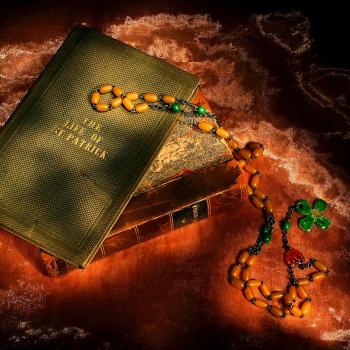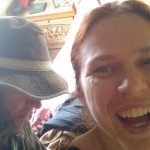My friend Peter Dybing and I are talking about conversions and whether I’d ever go back to Christianity. “Never!” I exclaim. It sounds a bit harsh, even to my own ears. I know I don’t ever want to go back. But I also know that I can’t discard my past completely. What I am seeking, is integration.

Sometimes people return to the religion of their childhood in times of suffering and grief because it provides tools they learned in formative years. “Have you been to a funeral of a loved one when you were young?” Peter asks. I shake my head. Nothing comes to mind. He looks surprised. “But what about your grandparents?”, he probes. That’s when the memory comes back.
December 29th, 1993
He is going to die. I stop dead on the stairs and swirl around to look up. He’s still standing in the doorway at the top of the stairs. A flash of pain crosses his face and he clutches his side, but only for a second. He acknowledges me with a nod and a smile. This is the last time I will see him. I don’t know what to do. I want to rush back up the stairs and hug him again, feel that he is alive. It won’t change it. Maybe I’m crazy. I’m hearing voices in my head.
I make myself smile back at him. “Opa, ich hab dich lieb!” I say. Grandpa, I love you. He smiles and nods and tells me that he loves me, too.“Bis bald!” See you soon. My own words mock me and I stumble down the rest of the stairs and out into the courtyard.
Mom asks if I am OK when I arrive at home. I nod absently. How was your time with Oma and Opa, she wants to know. Great. I guess. I try to ignore the foreboding tangle of emotions in my belly. There’s something wrong with me. There always has been. I hear voices in my head. I imagine things. And I can’t talk to anyone about it.
I distract myself for the rest of the day. By morning, I have forgotten. But as soon as the phone rings, the knot forms in my insides again. Each ring spells loss and pain. “Opa ist im Krankenhaus,” mom informs my brother and I as she puts down the receiver. Opa is in the hospital. He’s dying.
Mom didn’t say the second part, but I know. She talks about a possible diagnosis and that they’re running tests and what they’re going to do about and how everything should be OK, but I’ve stopped listening. It’s pointless, I want to shout. He’s dying, mom, I’ve known it since yesterday. Why can’t you see it?
My mom gathers us into the living room and puts on a movie. My brother and I sit down in front of the TV but I’m not paying attention. I’m trying to hear the conversations in the other room. I’m waiting. Waiting to learn that I’m just crazy, that Opa is fine and the voices in my head can’t be trusted. This is the longest movie of my life. I have no idea how to follow the plot. I just want to know if I’m crazy or if I can start grieving.
Several days later
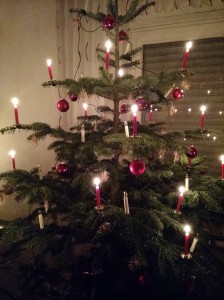
The funeral is today. I’ve never been to a funeral and I’m terrified. I barely listen to the briefing my mom is trying to give me. I just want to be left alone. We drive to Opa’s house, where everything still smells of him. His tuneless whistle floats through the rooms and every time a floorboard creaks, I think I can see his crutches approaching from just around the corner.
Strangers fill the house and I am introduced to them, my own cold fingers limp like a dead fish in the hands of Opa’s second cousin, former co-worker, and yet another person who is related to me, somehow. I want to run away. I wonder what would happen if I stormed out of the house and just let myself run until my legs give out. My family would panic, so I stay. When I think can’t take it anymore, I beg my mom to let me leave. How on earth do you think that’s supposed to work, she says. You can’t do that. We’re family, we’re obligated to be here and meet and greet the mourners.
Resigned, I curl up on the couch. A woman I’ve never met approaches me and explains how she knew Opa. Then she pats my head and talks to me as if I’m a toddler. “He was your grandpa, wasn’t he?” she coos. Suddenly I want nothing more than to shove her off of me, fiercely, to scream at her, scream at the whole damn room.
What do you care? I’ve never even met you! If you cared so much about Opa, where were you when he was still alive? Where were you then? I’ve never even met you. Who do you think you are to feel entitled to my time, my grief? Who gave you the right to come here and invade this place, to walk where Opa walked, to breathe his scent and tell me you understand? LEAVE ME ALONE!
By the time I’m finally allowed to leave, my body is shaking. My mom gives me a Valium and then we leave for the cemetery. I wish I could make myself invisible. Instead, I am led to the front rows of the funeral home. A pastor mumbles something about life and death and dozens of eyes are on my back, watching to see how I am coping. Then we process out to the grave. I fight hard not to cry, for every tear brings me more pitying stares from strangers, more pats on the back and the head, more meaningless words.
The Valium helps. I disassociate. I try to conform to socially accepted behavior, looking grief stricken, but not devastated, a tear here and there, but no sobbing. I stuff down my pain and my rage and I perform. To me, this ritual has nothing to do with my Opa or my grief.
Several years later
When Peter talks to me about mourning rituals, I can’t think of one more counterproductive to grieving than this funeral. It provided no space for my pain, no movement of energy, no container, no support. Back then I swore I’d never let anyone put me through a ritual like that again. I stayed true to my word and excused myself from attending the funerals of my three other grandparents.
When my cat Arwen died, I held her close as I felt her spirit leave her body. Then I cradled her lifeless form and said out loud, “Now what? Now what do I do?” I didn’t have a clue. I had nothing to fall back on. The funeral rites I had grown up with never even crossed my mind. I knew I had to reach within to create my own ritual.
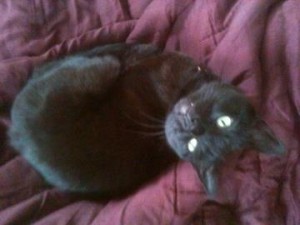
I thought back on scenes of grieving from the TV series Six Feet Under that explored the failure of Western funerals. So I made a little casket out of a shoebox and put rosemary and flowers on Arwen’s body. Then my partner took me to the forest and I dug a grave, slamming the shovel into the hard earth again and again until my arms gave out. I lowered Arwen into the hole, plunged my hands into the loosened soil and placed dirt on her coffin. Slowly and gently at first, but as the shoebox disappeared, I shoveled earth furiously. I fell on my knees, screaming out my pain, and clawing at the ground until I was spent. Then I lay on her grave, sobbing.
I called to the earth to take her home. I improvised prayers and arranged branches and moss on her grave. Then I left the woods, face and hands covered in mud made from dry earth and tears. And it felt right. A ritual that held my grief, that celebrated her life, and that honored the cycles of life and death.
Today
Since my arrival in Germany, I’ve been thinking about integration. I am surrounded by elements of my childhood faith. At the Christmas service I marvel at the traditionally decorated tree. Ancient hymns echo through the high beams and I remember singing them as a child. I love the old building, the smell of wood and candles and pine needles. But I find that I’d rather enjoy them in a silent meditation than in traditional liturgy.
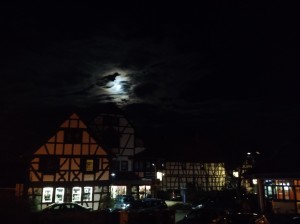
I sing the hymns and listen to the sermon dutifully. I discover that the “Holy Mother” prayer fits neatly into the time it takes to recite the Lord’s Prayer. I remember my favorite passages from the Charge of the Goddess during the Confession of Faith, noting how unlike a creed the poem sounds. I think back on the Pentecost liturgy that touched me so deeply a few years ago and helped me understand my path.
Sometimes I reflect on my life as if it was movie. I create soundtracks in my head as well as chapter titles. A few years ago I lived through chapter Truth, where I reevaluated everything I had been taught. Then I experienced chapter Love, and chapter Integrity, and chapter Healing. Most recently I reflected on life through the filter of Wisdom, and now I am living through chapter Integration.
When the service ends, I stand outside and bask in the light of the full moon. I ask my mom, who is on church council, to unlock the office so I can grab a few tealights. The candle on the church’s altar is the light of Bethlehem, a flame that was carried by airplane and trains all the way from Palestine. I pass the flame to my tea lights and take them home to light the candles on our Christmas tree. My mom loves the idea. She takes a peek at me in the rear view mirror. “You look so beautiful and peaceful in the glow of the candles,” she says. I smile and nod. This is where I find peace. This is what I came here for. This is integration.






